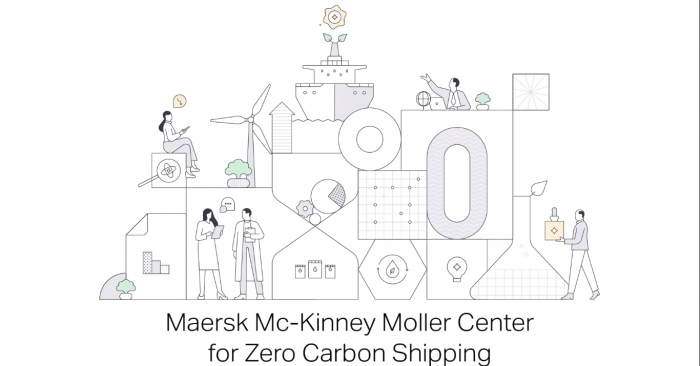Maersk Mc-Kinney Møller Center for Zero Carbon Shipping launched
June 29, 2020: A group of shipping industry players ABS, A.P. Møller - Mærsk, Cargill, MAN Energy Solutions, Mitsubishi Heavy Industries, NYK Line and Siemens Energy took the next step to develop new fuel types and technologies by launching the Mærsk Mc-Kinney Møller Center for Zero Carbon Shipping.

June 29, 2020: A group of shipping industry players ABS, A.P. Møller - Mærsk, Cargill, MAN Energy Solutions, Mitsubishi Heavy Industries, NYK Line and Siemens Energy took the next step to develop new fuel types and technologies by launching the Mærsk Mc-Kinney Møller Center for Zero Carbon Shipping.
A specialized, cross-disciplinary team
The center will be a non-profit organization, set up as a commercial foundation with a charitable purpose. As an independent research center, it will work across the entire shipping sector with industry, academia and authorities. A highly specialized, cross-disciplinary team will collaborate globally to create overviews of decarbonization pathways, accelerate the development of selected decarbonizing fuels and powering technologies, and support the establishment of regulatory, financial and commercial means to enable transformation.
The center, which will be based in Copenhagen, Denmark, is made possible by a start-up donation of DKK 400m by the A.P. Møller Foundation.
Mærsk Mc-Kinney Møller
Ane Uggla, chairman of the board, A.P. Møller Foundation said “With this donation, The A. P. Møller Foundation wishes to support the efforts to solve the climate issue in global shipping. My father, Mærsk Mc-Kinney Møller was a visionary leader in the global shipping industry for more than 7 decades. He was concerned about shipping’s impact on the environment. Already in the 1980’ies he championed the use of low sulphur fuel, and he pioneered the first double hull oil tankers in the 1990’ies to minimize the risk of oil spills. Therefore, I find it very natural that my Father’s name will be connected to the center.”
To define the strategic direction of the center, a board of directors is being established. Søren Skou, CEO of A.P. Møller – Mærsk has been confirmed as board member. Additional members of the board of directors will be announced upon appointment.
The center will have a management board, which will be headed by Bo Cerup-Simonsen as CEO of the center. Bo Cerup-Simonsen holds a PhD from the Technical University of Denmark in mechanical engineering, naval architecture and has a proven track record in leadership of large-scale industry projects, maritime technology, research and innovation.
More partner companies
The founding partner companies bring a common commitment to decarbonizing shipping and specialized knowledge and research capabilities. Furthermore, the founding partners will donate expert people resources and/or testing platforms to support the operations. The Center expects to attract several more partner companies in the future.
During the first two to three years the center will recruit around 100 employees to the Copenhagen-based office and collaborate with new partners across the globe. The founding partner companies have committed one-third of the needed staff, the remaining two-thirds will be recruited independently. In addition to leadership and administration, the Center staff will include subject matter experts in energy, fuels and ship technology as well as regulatory affairs, finance and the global energy transition.
Shipping’s road map to decarbonization
The shipping sector accounts for around 3 percent of global carbon emissions. The industry has made a firm commitment to reduce this to zero within this century. Short-term measures related to increased energy efficiency is enabling a 40 percent relative reduction by 2030.
Achieving the long-term target requires new fuel types and a systemic change within the industry. As shipping is a globally regulated industry, there is opportunity to secure broad-based industry adoption of new technology and fuels.
To accelerate the development of viable technologies a coordinated effort within applied research is needed across the entire supply chain. Industry leaders play a critical role in ensuring that laboratory research is successfully matured to scalable solutions matching the needs of industry. At the same time, new legislation will be required to enable the transition towards decarbonization.



